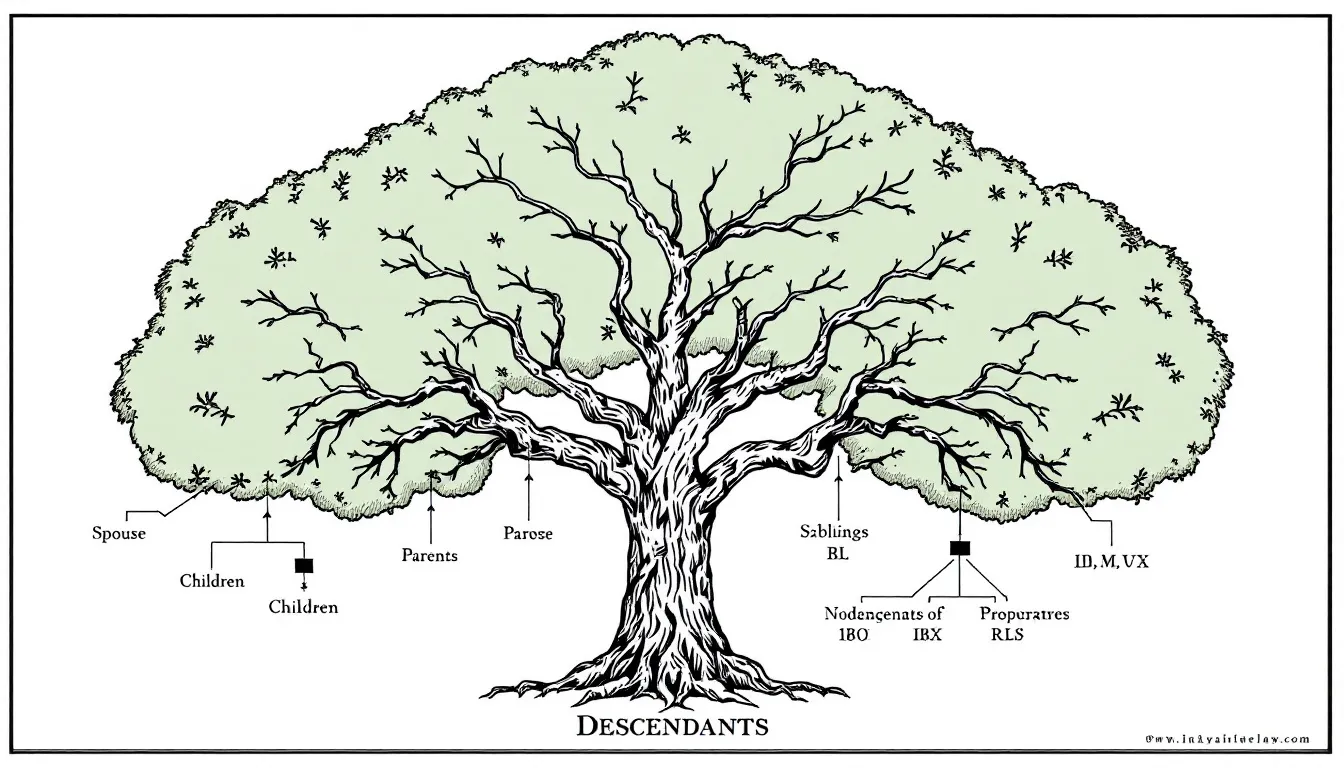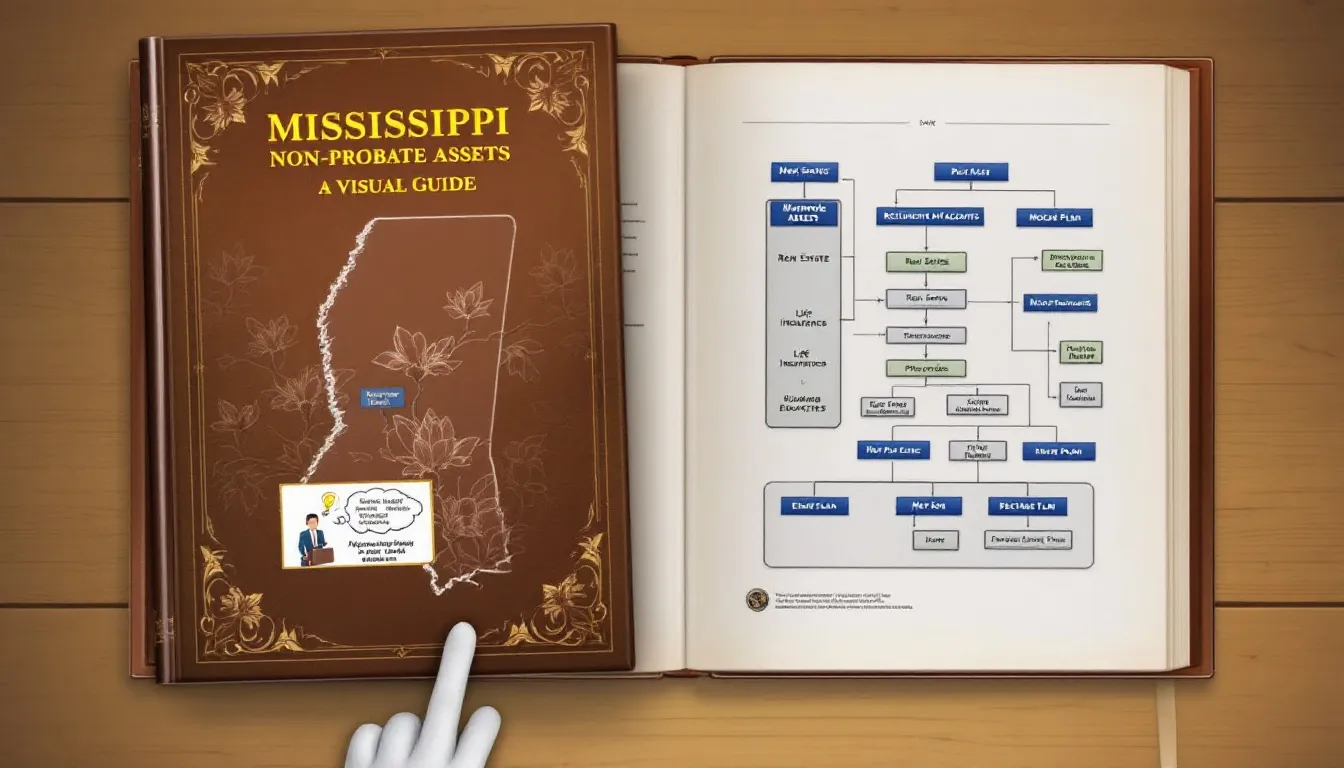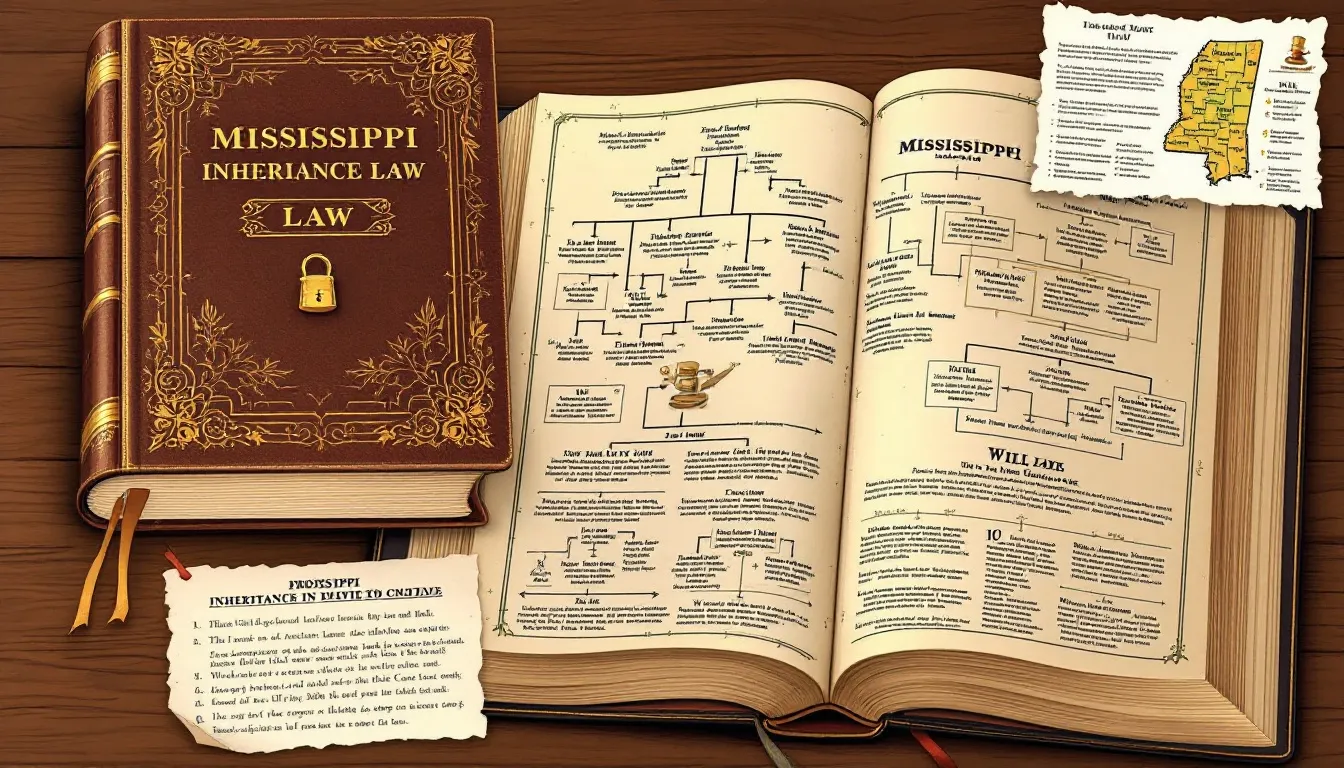Mississippi Inheritance Laws: Essential Guide for 2024
Navigating Mississippi inheritance laws is essential for both estate planning and managing a loved one’s estate. Beneficiaries do not have to pay taxes on inherited assets in Mississippi. This guide explains the absence of state inheritance taxes, the process for validating a will, and the rules for distributing assets if there is no will. Although Mississippi does not impose a state estate tax, federal estate tax regulations still apply, particularly for larger estates. Stay informed to ensure your assets are distributed according to your wishes or to manage an estate efficiently.
Key Takeaways
- Mississippi has no inheritance or estate taxes, but federal estate taxes may apply if your estate exceeds $13.61 million. Beneficiaries in Mississippi do not have to pay taxes on inherited assets, and the absence of a state estate tax further simplifies estate planning for residents.
- Creating a will in Mississippi is essential; without one, your assets will follow state intestate laws, which may not reflect your wishes.
- Certain assets like life insurance and jointly owned properties can avoid probate, making the transfer process simpler for your heirs.
Mississippi Inheritance Tax and Estate Tax Overview
If you’ve been worrying about the potential tax burden on your inheritance in Mississippi, here’s some good news: Mississippi does not impose an inheritance tax or a gift tax. Beneficiaries do not have to pay taxes on inherited assets in Mississippi. This means that if you inherit property or money, you won’t owe the state any taxes on your inheritance. Additionally, since January 1, 2005, Mississippi has effectively eliminated its estate tax and the Mississippi estate tax for decedents. Mississippi does not impose a state estate tax, which is beneficial for residents.
However, before you breathe a complete sigh of relief, it’s important to understand that federal estate taxes may still apply if your estate exceeds the federal exemption threshold. For estates exceeding this threshold, the tax burden can be significant. This means that while you might escape state taxes, you could still face substantial federal tax liabilities if your estate is large enough, especially considering the estate tax laws.
Understanding the absence of Mississippi inheritance and estate taxes, alongside the implications of federal estate taxes, is crucial for effective estate tax planning. Being informed helps you strategize to minimize tax liabilities, ensuring more of your assets go to your heirs.
Federal Estate Tax Exemption in 2024
The federal estate tax exemption is quite significant for 2024. It is established at $13.61 million per individual. This means that if the total value of an individual’s estate is below this threshold, it will not be subject to federal estate taxes. For married couples, this exemption can be combined, allowing a total exemption of $27.22 million.
If an estate exceeds these exemption amounts, the portion above the threshold will be subject to federal estate taxes at significant rates, leading to substantial tax liabilities. Individuals with large estates should plan to minimize liabilities and ensure the maximum amount of their estate is passed on to their heirs.
The unlimited marital deduction permits spouses to transfer assets without facing any estate tax. This allows for an unlimited amount of assets to be exchanged between them. This provision can be particularly beneficial in estate tax planning, enabling couples to defer taxes until the death of the surviving spouse. Understanding and planning for these exemptions and deductions can significantly reduce your estate’s tax burden.
Dying With a Will in Mississippi
Creating a will is one of the most important steps in ensuring that your assets are distributed according to your wishes. Creating a valid will in Mississippi requires an individual to be at least 18 years old and mentally competent. The will must be written with the clear intent to serve as the person’s last will and testament. Additionally, it must be signed in front of two witnesses, although notarization is optional.
When a person dies with a valid will, their assets typically go through the probate process, unless specific exemptions apply. The probate process involves validating the will, paying off debts and taxes, and distributing the remaining assets to the beneficiaries as specified in the will. While this process can be time-consuming, having a will in place provides clear instructions and can help prevent disputes among heirs.
Without a will, the deceased person’s estate is subject to Mississippi’s intestate succession laws, which may not align with the decedent’s wishes. Thus, having a will is crucial for ensuring that your assets are distributed according to your desires, rather than being left to the default rules of intestate succession.
Intestate Succession in Mississippi

When someone dies without a will in Mississippi, their assets are distributed according to the state’s intestate succession laws. These laws are designed to distribute the decedent’s estate to their closest family members, starting with the spouse and children.
The estate process in intestate succession aims to ensure that family members inherit the deceased person’s assets in an orderly and predictable manner. The exact distribution depends on various factors, including whether the decedent was married, had children, or was survived by other relatives.
Let’s dive deeper into how these laws impact spouses, children, and extended family members.
Spouses and Children in Intestate Succession
In Mississippi, legally recognized children, including biological and legally adopted children, are entitled to inherit under intestate succession laws. If a person dies with a surviving spouse and one child, the estate is divided equally, with the spouse inheriting half and the child inheriting the other half. In cases where there are multiple children, the estate is split equally among the spouse and all children.
If there are no children or descendants, the surviving spouse inherits the entire estate. Conversely, if there are children but no surviving spouse, those children inherit everything. The inheritance share of a surviving spouse changes based on the number of children, ensuring a fair distribution among all heirs.
Posthumous children, born after the decedent’s death but within a specific timeframe, are eligible to inherit if they survive at least 120 hours after birth. This ensures that all potential heirs are considered in the distribution of the estate.
Extended Family Inheritance
If an unmarried individual without children dies in Mississippi, the estate is inherited by the closest living relatives. In the absence of close relatives, the estate may be distributed to grandparents, uncles, or aunts. This hierarchy ensures that the assets remain within the family as much as possible.
Furthermore, if a grandparent dies and one of their children is deceased, the grandchildren can claim their parent’s share of the inheritance. This provision ensures that the descendants of the decedent’s children are not overlooked and receive their rightful share of the estate.
Non-Probate Assets in Mississippi

In Mississippi, certain assets can bypass the probate process, saving time and reducing the complexity of estate administration. These non-probate assets include jointly owned property, life insurance policies, and retirement accounts with designated beneficiaries.
Real estate can avoid probate through a transfer-on-death deed, which allows the property to pass directly to the designated beneficiary upon the owner’s death. Similarly, jointly owned properties with rights of survivorship automatically transfer to the surviving owner without going through probate. This can significantly simplify the transfer process and avoid delays.
Life insurance payouts and retirement accounts like IRAs and 401(k)s also transfer directly to the named beneficiaries, bypassing the probate process. Establishing a living trust is another effective way to ensure immediate asset transfer to beneficiaries after death, helping to reduce overall estate tax liabilities and maintain privacy.
Special Considerations in Mississippi Inheritance Law

Mississippi inheritance law has several unique aspects that can impact the distribution of assets. For instance, half-relatives inherit only after whole relatives have received their shares. If a decedent has both half-siblings and full siblings, the full siblings inherit first.
Posthumous relatives, or those born after the decedent’s death, are treated as if they were alive at the time of the decedent’s death for inheritance purposes. Additionally, immigration status does not impact a relative’s right to inherit in Mississippi, ensuring that all family members are considered.
Understanding these special considerations is crucial for ensuring that all potential heirs are accounted for and that the distribution of assets is fair and equitable.
Strategies for Estate Planning in Mississippi
Effective estate planning minimizes tax liabilities and ensures your assets are distributed according to your wishes. Strategies for reducing estate tax liabilities include gifting assets, setting up irrevocable trusts, making charitable donations, and using Family Limited Partnerships (FLPs).
In 2024, the federal gift tax exclusion permits individuals to gift up to $18,000 per person annually. This gifting limit can be done without incurring any federal gift taxes. This can be a useful tool in estate planning, enabling individuals to transfer wealth during their lifetime and reduce the size of their taxable estate.
Proper estate planning reduces tax obligations and ensures a smoother transfer of assets to heirs. With the estate tax exemption expected to drop to approximately $7 million per individual in 2026, it’s more important than ever to plan ahead and take advantage of current tax benefits.
Resources for Estate Planning
The right resources can simplify and make estate planning more effective. Consulting a financial advisor or estate planning attorney provides personalized advice tailored to your situation.
Specialized estate planning software can enhance an advisor’s ability to project clients’ wealth and tax liabilities, aiding the planning process. Tools like SmartAsset’s free advisor matching service can help you find vetted financial advisors who can assist with your estate planning needs.
Summary
Understanding Mississippi inheritance laws is essential for effective estate planning. Beneficiaries do not have to pay taxes on inherited assets in Mississippi. From the absence of state inheritance taxes to the specifics of federal estate tax exemptions, this guide has covered the key aspects you need to know. Additionally, Mississippi does not impose a state estate tax, which can be beneficial for residents, though federal estate tax regulations still apply, particularly for larger estates.
Proper estate planning can help minimize tax liabilities and ensure that your assets are distributed according to your wishes. By being informed and seeking professional advice, you can navigate the complexities of Mississippi inheritance laws with confidence.
Frequently Asked Questions
Does Mississippi impose an estate tax?
Mississippi doesn’t have an estate tax, so you can breathe easy on that front!
What is the federal estate tax exemption for 2024?
The federal estate tax exemption for 2024 is set at $13.61 million per individual, and $27.22 million for married couples. It’s a big deal for estate planning!
What happens if an estate exceeds the federal estate tax exemption?
If an estate exceeds the federal estate tax exemption, it will be hit with a hefty tax burden. It’s a good idea to be aware of estate planning strategies to minimize these taxes.
Does Mississippi have an inheritance tax?
Nope, Mississippi doesn’t have an inheritance tax, so you’re in the clear there!
What is the annual federal gift tax exclusion for 2024?
In 2024, you can gift up to $18,000 per person each year without triggering any federal gift tax. So go ahead and share the love without worrying about the tax man!








